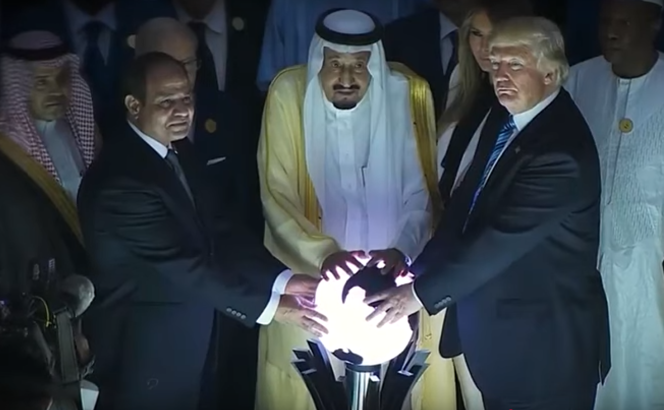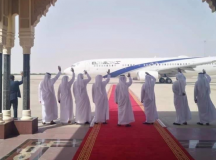Open-source intelligence analyst John Fenn examines Saudi counter-extremism centre Etidal’s attempts to confront online extremism. Fenn situates such work in the context of the wider development of an ‘axis of moderation’ across the Sunni Gulf
Saudi Arabia
My interest in Etidal (moderation in Arabic), or the Global Centre for Combating Extremist Ideology to use the full official name, began in May 2017 when I observed Donald Trump, serving then in his first term as US president, attend the inauguration ceremony in Riyadh alongside Saudi King Salman bin Abdulaziz Al-Saud and Egyptian President Abdel Fattah el-Sisi. I watched the live broadcast with work colleagues, and the sight of the three leaders touching an illuminated globe to officially open Etidal stayed with me. It triggered flashbacks to physics lessons and the hair-raising Van de Graaff generator during my school years…
A sense of humour is important when you monitor extremist and terrorist output daily, especially when navigating the darker sides of the web like Telegram. The Dubai-based social media platform attracts extremists and terrorist groups because of the high degree of anonymity, ease of messaging, encryption, and large file sharing. Russian-born billionaire and Telegram CEO Pavel Durov was detained by French authorities in August 2024, in a bid to force change on other nefarious platform activity like child sexual abuse and criminality, but he was eventually released and flew back to Dubai in March this year. (The EU is investigating whether Telegram breached digital rules by failing to provide accurate user numbers. The suspicion is that Telegram understated its EU user base to stay under a 45 million threshold, above which large online platforms are subject to much stricter regulations to control malign influence).[i] [See Tal Hagin’s article in Fathom on the Hamas and Palestinian Islamic Jihad use of Telegram]
Etidal grasped the significance of Telegram from the get-go. A press release, dated February 2022, noted already over three years’ worth of engagement with Telegram to ‘prevent and combat terrorism and violent extremism by monitoring and removing terrorist propaganda published in Arabic.’ The two parties entered into a further Memorandum of Understanding in January 2025 to continue the ‘strong relationship and fruitful work.’ The MoU, signed by Etidal Secretary-General Mansour Al-Shammari and Mike Ravdonikas on behalf of Telegram, hopes ‘to open new horizons for continuing joint cooperation in combating extremist and terrorist propaganda activity.’
But just how ‘fruitful’ has the collaboration been?
They have a public track record of taking down posts and channels, but from only three designated terrorist groups (DTGs): the so-called[ii] Islamic State (IS), Al-Qaeda (AQ), and one-time AQ-offshoot Hayat Tahrir Al-Sham (HTS). The centre published quarterly takedown statistics but stopped specific group-based updates shortly after HTS leader Ahmad Al-Sharaa [nom de guerre Abu Mohammed Al-Jolani] took over Damascus and began governing Syria in December 2024. Goodwill toward a peaceful transition and regional sensitivities will have played a part in the centre’s decision making.
Etidal’s last official detailed record – courtesy of the Saudi Press Agency because this material is no longer on the centre’s website – is dated 6 October 2024 and claimed 323 channel takedowns [IS, 189; AQ, 47; HTS, 87] and 35.6 million post removals during a three month period (Q3 2024). IS posts accounted for almost all removals (34.6 million), compared to AQ (263,489) and HTS (768,821).
Etidal recently celebrated over 207+ million Telegram post takedowns between February 2022 and the end of June this year, but again omitted any mention of group breakdown. The total channel takedown figure had reached 17,455, which is a significant amount, will have caused terrorist channel administrators a lot of inconvenience, and is worthy of praise.[iii]
Saudi Arabia certainly has motive for focusing on IS and AQ, as both groups carried out deadly attacks in the past and continue to pose a threat to security in the Kingdom. An added benefit will be the removal of output hostile to Saudi Crown Prince Mohammad bin Salman (MBS). This was plentiful when I was monitoring IS media full-time: derogatory editorials and features in professionally produced online IS publications, to AI-generated images of the Crown Prince in IDF military uniform or ultra-Orthodox Jewish garb, or defaming the House of Al-Saud for not confronting Israel and for opening up society toward Vision 2030. Whenever I came across this material, I would always envisage MBS picking up the phone and politely reminding Telegram, in nearby Dubai, of the consequences of not enforcing their community guidelines.
IS Khurasan Province – the terrorist group’s operation in Afghanistan, Pakistan, Iran, Central Asia and farther afield (Moscow concert hall attack in April 2024) – also had a special enmity toward MBS during 2022-23. Around the same time, I recall that Saudi Foreign Minister Prince Faisal bin Farhan bin Abdullah and then US Secretary of State Antony Blinken chaired a Riyadh-hosted ministerial meeting of the Global Coalition against Daesh (IS) in June 2023: the press release stated the Saudi minister also welcomed the establishment of a ‘focus group to combat Daesh (IS) in the Khurasan Province in Afghanistan…’
The centre was asked to comment on whether other DTG channels fell under its remit, but no response was received, unfortunately. It would be good to know if it is taking down Iran-aligned ‘axis of resistance’ and other DTG output covertly, for instance (groups like Iraq-based Kataib Hezbollah do openly call for jihad in Saudi Arabia and threaten attacks), or what their stance is on the many posts denigrating Jews? Saudi Arabia has proscribed the Muslim Brotherhood: does it also consider Hamas output on Telegram to be worthy of takedown? What about takedowns on other platforms like X (formerly Twitter): DTGs and supporters have increasingly migrated to this platform since Elon Musk’s takeover in 2022?
A lot of online moderation by Etidal does go unnoticed and it can be hard to quantify impact. Publicity images show row upon row of employees at computer screens monitoring Arabic discourse on social media and countering extremist comments and posts. I have seen some of this dialogue myself because DTG supporters occasionally share their anger and discontent whenever they are challenged online or accounts taken down. Etidal moderators are often denigrated as ‘flies’; a recognition of sorts for their persistence, but with the implication that they can also be easily swatted away. Etidal should profile this abusive behaviour to demonstrate their all-round activity, or when they achieve any level of atonement online, but the centre generally avoids the public spotlight for security reasons.
Many think-tanks have noted that the Gulf states crave stability above everything else and prefer not to antagonise the Iranian regime, which could explain Etidal’s silence on whether it covertly takes down ‘axis of resistance’ messaging on Telegram and other platforms.
Other Saudi moderation efforts are worthy of note and do occasionally receive publicity. The Mohammed bin Nayef Centre for Counselling and Care, for instance, was founded in 2004, primarily to counter a spate of deadly AQ terrorist attacks in the Kingdom and to assist in the repatriation of Guantanamo Bay detainees in the aftermath of 9/11. A BBC report in 2017 noted that over 3,300 mostly Saudi nationals had ‘graduated’ from the centre and that the recidivism rate was 20 per cent, which in the field of rehabilitation is considered a huge success. The other 80 per cent were able to return to society and moved away from extremism.
The Saudi-based Muslim World League (MWL) and the Saudi Defence Ministry’s Intellectual Warfare Centre (IWC) also counter extremism. The author attended a London discussion in June with MWL Secretary-General Dr Mohammad Abdulkarim Al-Issa, who also heads up the IWC, and moderation in Islam and tolerance were very much the topics of the day.
A huge supporter of the overall Saudi moderation effort is Edmond Fitton-Brown, former UK ambassador to Yemen (2015-2017), who visited Etidal in 2018 in his then role as UN Coordinator of the IS/AQ/Taliban Sanctions Monitoring Team but who, by his own admission, was more focused at the hard counterterrorism end rather than counter extremism and efforts to win over hearts and minds. He recently commented to the author:
The Mohammed bin Nayef centre has done a lot of good work on deradicalisation and reintegration of terrorist offenders. The advantage of the Saudis acting in this area is that they carry a lot of credibility because they are at the heart of the Islamic world and being guardians of the [two] holy places gives them a level of authority that other countries in the region do not have.
On the negative role played by Telegram, Fitton-Brown did not hold back:
I would have loved to see people like Durov thrown into jail for a long period for breaching all sorts of counterterrorism legislation and for broadcasting hate speech and allowing incendiary things to remain on their platform. I do not see much prospect of doing anything about that simply because people have been trying for years, for as long as I can remember. Telegram has always been a problem. The best approach could be to see it as an enforcement challenge.
He recalled that Europol took some serious action against Telegram in 2019, but the level of activity was not sustained unfortunately. He added: ‘It may be a Sisyphean task, but we must keep doing what we can to combat hate speech and radicalisation, and indeed terrorism online.’
United Arab Emirates and Qatar
Abu Dhabi-based Hedayah (guidance in Arabic), the International Centre of Excellence for Countering Extremism and Violent Extremism, was founded in 2013 and plays an important moderation role. The centre’s primary objective is local capacity building, rolling out programmes to communities under threat from violent extremism and terrorism; by showcasing deradicalisation and rehabilitation best practice, for instance, the hope is that local practitioners and governments will have greater impact in their populations.
The centre also plays a crucial networking role and holds regular seminars and conferences for knowledge sharing. This year’s annual International Research Conference (10-12 November) will be held in Brussels, Belgium, and promises to shed light on ‘present and evolving extremist and violent extremist threats and challenges.’ The event receives financial support from the European Union and is in partnership with the EU Knowledge Hub on Prevention of Radicalisation.
The UAE’s participation in the Abraham Accords, along with Morocco and Bahrain, is another example of its important moderation role and support for long-term peace in the Middle East. Fitton-Brown also praises the UAE for being clear-sighted on the threat posed by the Muslim Brotherhood and its decision to proscribe the group:
The Emiratis feel very strongly about Islamist entryism and the idea that the Muslim Brotherhood would seek to find its way into positions of influence in the Middle East, but also in the West, to ultimately pursue a radical Islamist agenda. I think the Emiratis are right about that, and they have seen it very clearly over a long period.
By contrast, Qatar’s record on moderation is open to debate and its allegiances will be under the spotlight if the United States does proscribe the Muslim Brotherhood. Doha has a long track record of hosting influencers like now deceased cleric Yusuf Al-Qaradawi and DTG leadership and delegations like Hamas and the Taliban, while Doha-based Al Jazeera Arabic TV routinely airs and posts full unredacted versions of DTG-logoed propaganda, especially Hamas and Palestinian Islamic Jihad attack and hostage videos. Fitton-Brown believes the US will proscribe the Muslim Brotherhood and that would force Qatar to ‘pick a side’.[iv]
Conclusion
Saudi analyst and Dubai-based Najwa AlSaeed spoke of the importance of the ‘axis of moderation’ in countering the Iran-aligned ‘axis of resistance’ during an interview with the Fathom editors in February 2025. The term dates back to at least 2017, the year of the Etidal opening, and includes the Gulf states (with the exception of Qatar), Egypt and Jordan. Fitton-Brown concurs by noting a clear gulf in regional moderation: ‘I regard Qatar, on the one hand, as an agent of radicalisation, and Saudi Arabia and the UAE, certainly in the modern era, as agents of deradicalisation.’
One could argue that countering radicalisation is good for business and security. Moderation does makes sense for those who seek stability above all else. Many commentators have argued that the real motivation for the 7 October 2023 attack was to derail Saudi moves to normalise ties with Israel and participation in the Abraham Accords. This conundrum remains and UN General Assembly session outcomes this month could decide the fate of many in the region.
[i] I have observed DTG supporters sharing bomb-making videos on Telegram. The content remained online despite flagging up via Telegram’s on-platform reporting mechanism and other external regulatory and content moderation routes.
[ii] The reporting of DTGs in the media is always a bone of contention for me. We soon got used to newsreaders and reporters describing the latest bloody actions of ‘so-called Islamic State’, the prefix used because not all Muslims endorse the group’s state-building agenda and religious authority. Why shouldn’t the same apply for the Islamic Resistance Movement [Harakat al-Muqawamah al-Islamiyah in Arabic], instead of the blunted abbreviation Hamas? After all, not every Muslim is moved by the group’s resistance agenda against Israel in the name of Islam. The Irish rap outfit Kneecap, who hail from a Catholic background but adhere to no religion apparently, might think twice about offering support for the ‘Islamic Resistance Movement’ or the ‘Party of God [Hezbollah]’ when next showcasing their pro-Palestine credentials.
[iii] For comparison, the Telegram-operated ISIS Watch channel [t.me/ISISwatch] claimed 24,463 terrorist bots and channels were removed during August 2025. It is unclear whether the Etidal removals are included in the monthly and annual figures provided by Telegram.
[iv] Speaking candidly, as a former ambassador, Fitton-Brown added that if the US does proscribe the Muslim Brotherhood it would have real implications for the UK as well: ‘When I was a diplomat in Egypt in the 1990s, the Egyptians were sounding the alarm and saying don’t you know what kind of people you are incubating in London? And the answer we were getting from London was unfortunately that these people are not extremists, they are not subversives, they are political dissidents. I think that was an extraordinarily naive and irresponsible perspective and I think the UK will suffer for it in the long term because the Muslim Brotherhood has managed to insinuate itself into all corners of British society now.’



































